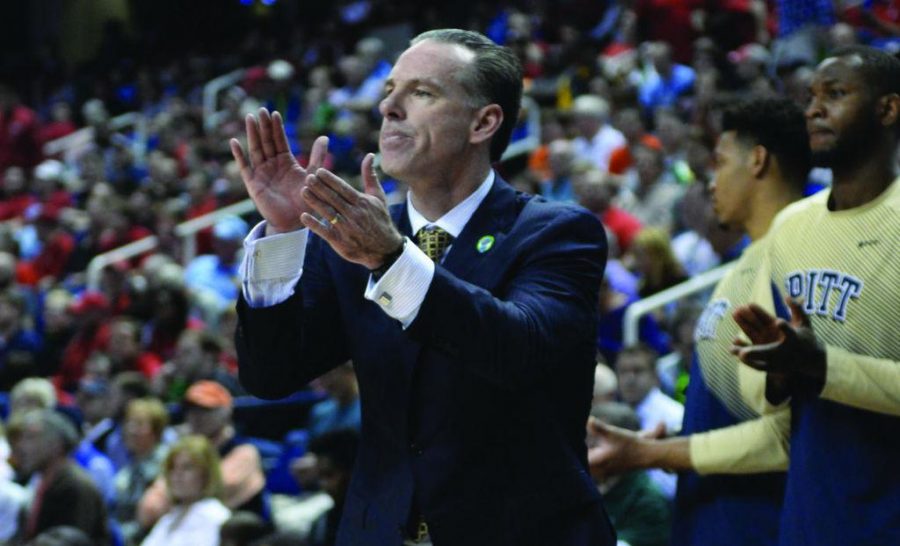Change isn’t always good — but as is the case of the 2015 Pitt basketball team, change was necessary.
Following a 19-15 record and a first-round NIT exit last season, head coach Jamie Dixon has seen the makeup of his Pitt basketball roster change drastically, losing Cameron Wright and Durand Johnson to graduation while adding three graduate transfers and two additional recruits.
Now, he will have to make sense of the current team.
One of the most crucial of those three graduate transfers is Alonzo Nelson-Ododa, a forward from the University of Richmond.
Dixon is excited about Nelson-Ododa’s abilities and the depth he adds to the frontcourt. That excitement, though, comes with a caveat: he needs to remain on the court. Nelson-Ododa has missed offseason workouts because of surgery on his eye resulting from an infection in a fractured cheekbone, which was operated on last season.
“We’re gonna have to get him healthy and stay healthy,” Dixon said. “That’s been a challenge for us the last couple of years.”
Whether through bad luck or conditioning, staying healthy has been a problem for Dixon’s teams in recent years, especially last season. These injuries depleted Pitt’s depth last year, which Dixon believes is a primary factor for his team missing the NCAA tournament.
Pitt’s perimeter depth was especially diminished last season after Durand Johnson was suspended from the program. Cameron Wright missed the beginning of the season with a broken foot and Cameron Johnson missed most of the year with a shoulder injury.
“We had an injury, suspension, and another injury on three perimeter guys, so that’s going to take away from your depth,” Dixon said.
Durand Johnson and Cameron Johnson’s absences specifically hurt Pitt’s three-point shooting, as Pitt finished 179th in the country in three-point percentage at 34.2 percent, a .9 percent dropoff from the season before. Dixon called Cameron Johnson Pitt’s best shooter last year, which means that between his injury and Durand Johnson’s suspension, Pitt has effectively lost its most proficient shooters.
With the addition of Sterling Smith, a guard transfer from Coppin State who shot 41.8 percent from three last season, along with Cameron Johnson’s return, Dixon is confident that Pitt will be much improved in that regard. He’s also counting on other players improving from the perimeter, specifically Josh Newkirk and James Robinson, who are currently out because of knee and foot surgery, respectively.
“I think we’ll have some guys improve as shooters. James [Robinson] and Josh [Newkirk], once they get off their injuries, will improve,” Dixon said.
Despite deficiencies in shooting and driving ability, Pitt’s offense last season was effective, ranking 30th in adjusted offensive efficiency, according to NCAA basketball advanced statistics website Kenpom.com. Dixon expects that to carry on as long as his team is able to maintain the qualities which have made his offenses effective.
“We’ve got to be balanced offensively, as we’ve always have. We’ve got to continue to pass the ball well,” Dixon said. “We did a lot of good things offensively, but we can always be better.”
That effectiveness, in large part, was because of forward Jamel Artis’ scoring prowess. On the season, Artis averaged 13.6 points per game on 46.9 percent shooting. Those numbers only got better as the year went on, improvements which coincided with Artis’ move from small forward to power forward. Starting last season, Dixon has been working on the transition of Artis back to small forward, which Dixon plans to continue next season.
“That process has always been in the works and that’s something that we’ve envisioned and is happening as we continue to move forward,” Dixon said.
For all of Artis’ offensive success, he struggled on the defensive end. That was a team-wide trend, as Pitt finished 143rd in the country in points allowed and 330th in rebounding.
Dixon says a combination of factors led to these struggles.
“Health, depth, experience. I don’t think you can put it on one thing. Execution and understanding, that comes with experience,” Dixon said. “I’m looking forward to having depth like we’ve had in the past, that’s what I think can really improve us defensively.”
That depth is what largely gives Dixon confidence in his team’s ability to improve greatly from last year.
“On paper, with everybody healthy, I think we’ve got some depth, and some experienced depth at the same time,” Dixon said.
Along with depth, Dixon likes the versatility of his team, with players having the ability to play multiple positions — especially those on the perimeter.
“I think we’ve got some guys on the perimeter that can play a couple different spots. And if you have a lot of them, you can spread them around and put them at different spots. But if you’re limited [because of depth] guys get locked into one spot,” Dixon said.
Last season, though, serves as a cautionary tale for Dixon to not get too optimistic, as depth and experience can quickly fade away.
“We thought we’d be older last year, but when you take out your two most experienced guys early in the year, you get young real quickly,” Dixon said, referring to Cameron Wright and Durand Johnson.
If his team can stay healthy, Dixon is confident that his newfound depth and experience can help, to an extent, patch up some shooting and defensive struggles.
Improvement on those ends, especially defensively, will go a long way towards getting back to the NCAA Tournament.
“We’ve got to rebound and defend and do it at a level that we’ve always done, which is best in the league, if not best in the country, at certain times over the past decade,” Dixon said.
Of course, Dixon is not limiting his team to improving only in those areas.
“We’ve got to get better at everything,” Dixon said.


